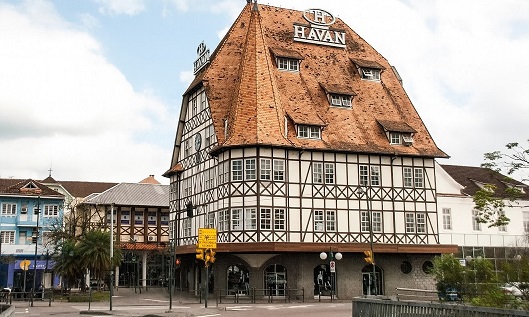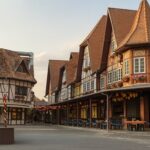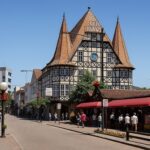
Wander through the streets of Blumenau and you might think you’ve stumbled into a pocket of Germany set down in the lush tropics of Brazil. Half-timbered houses line the roads. Locals sip beer from hefty steins. Street names echo German towns. Even the rhythm of the language – a blend of Portuguese with unmistakable German cadence – tells you something unusual is happening here.
Blumenau is more than a city with German heritage. It’s a living cultural mosaic where everyday life is deeply rooted in the customs of the settlers who arrived in the 19th century. Today, many of these traditions continue to shape how people eat, speak, work, and celebrate.
This article explores what daily life looks like in Blumenau for residents influenced by generations of German-Brazilian identity. From morning greetings to Sunday meals, here’s how the Old World continues to thrive in the New.
➡️ Related: German Fachwerk in Brazil: Architecture of Blumenau
Language: Portuguese with a German Twist
Portuguese is the official language of Blumenau – but listen closely, and you’ll hear something distinctive. German dialects, especially Plattdeutsch (Low German), are still spoken among older residents and in rural areas. Many families use a hybrid form of “Germanized Portuguese” with German vocabulary or syntax influencing everyday speech.
While German is no longer the dominant language, its cultural influence remains through:
- Street and neighborhood names (e.g., Rua Hermann Hering, Bairro Itoupava)
- German-language newspapers and radio programs
- Dual-language schools and cultural centers
Language schools and heritage associations continue teaching German, particularly during childhood education and in preparation for cultural festivals like Oktoberfest.
Food and Meals: Bratwurst, Sauerkraut, and Brazilian Flair
German culinary influence is strongest in the home kitchens and Sunday feasts of Blumenau. Meals often feature:
- Wurst: Various types of sausage, including Bratwurst and Weisswurst
- Sauerkraut and Kartoffelsalat (potato salad)
- Rouladen (beef rolls) and Schnitzel
- Local twists like cassava dumplings and rice served with German sauces
Bakeries are another hallmark of German daily life. You’ll find:
- Apfelstrudel and Stollen
- Schneeballen and Kuchen
- Dark rye and multigrain breads with poppy or sunflower seeds
Meals often follow a set routine:
- Breakfast (Frühstück): Bread, butter, ham, cheese, and strong coffee
- Lunch (Mittagessen): The main meal, usually meat-heavy
- Afternoon Coffee (Kaffeezeit): Often includes cake and conversation
- Dinner (Abendessen): Lighter, usually bread-based
➡️ Related: Blumenau Oktoberfest: Brazil’s Biggest Bavarian Bash
Hospitality and Social Etiquette
In German-Brazilian households, orderliness and politeness are highly valued. Guests are usually expected to:
- Arrive on time (punctuality is a sign of respect)
- Remove shoes or wear slippers indoors
- Bring a small gift like wine, flowers, or sweets
Formal address is still used among older generations. Even close neighbors may greet each other with “Senhor” or “Senhora,” particularly when the relationship is more formal.
Table manners often follow Central European traditions:
- Fork in the left hand, knife in the right
- Wait for the host to say “Guten Appetit” or “Bom apetite”
- Toasts with eye contact and the phrase “Prost!”
Work Culture: Precision and Punctuality
German influence is also visible in Blumenau’s business culture. Local industries – especially textiles and brewing – have long prided themselves on efficiency, quality, and reliability. Characteristics of the work culture include:
- Strong adherence to deadlines and schedules
- Preference for direct, clear communication
- Respect for hierarchy in business settings
Employees are often expected to:
- Arrive a few minutes early
- Follow procedures strictly
- Maintain a clean and organized workspace
German values like Ordnung (order) and Pflicht (duty) shape how work is approached – even as Brazilian flexibility and creativity bring balance.
➡️ Related: Founding of Blumenau: German Roots in Brazil
Religion and Celebrations
Blumenau has a mix of Catholic, Lutheran, and Evangelical communities, with churches playing a central role in social life. Religious holidays are often observed in both Brazilian and German traditions.
Key celebrations include:
- Advent and Christmas: With Christkindl markets and nativity scenes
- Easter: Featuring egg-decorating and festive breads
- Harvest Festivals: Local versions of Erntedankfest
Family is central to religious observance, with gatherings involving shared meals, music, and story-telling.
Clothing and Style
While modern clothing dominates, traditional German dress makes appearances during festivals, parades, and heritage events. You’ll often see:
- Dirndls and Lederhosen at Oktoberfest
- Embroidered aprons and bonnets at folk performances
Some older residents still wear modest rural styles, especially in the countryside, where wide-brimmed hats, vests, and long skirts remain part of everyday attire.
Education and Cultural Transmission
Schools in Blumenau follow the national Brazilian curriculum but often integrate cultural programs such as:
- German language instruction
- German-Brazilian history units
- Music and dance classes focused on folk traditions
Children participate in events like:
- Heritage week parades
- Craft fairs featuring German toys, instruments, and clothing
- Intercultural exchanges with schools in Germany
Several local institutions offer scholarships and exchange programs with German partner cities.
Community Life and Recreation
Blumenau’s social calendar is packed with events that reflect both Brazilian and German heritage. Locals enjoy:
- Singing clubs (Gesangvereine)
- Dancing groups (Tanzgruppen)
- Shooting clubs (Schützenvereine)
Public parks often feature gazebos built in German style, and Sundays are reserved for family walks, open-air concerts, or riverside picnics – all echoing the traditions of small-town Germany.
Blumenau Today: Pride in Everyday Heritage
The unique blend of German and Brazilian customs isn’t a historical artifact – it’s alive in the small details of everyday life. Whether it’s a father teaching his son to make sauerkraut, or a group of teens practicing folk dance, Blumenau’s traditions are continuously passed on, not preserved in a museum.
Many residents identify as Deutschbrasilianer (German-Brazilians) and take pride in their hybrid culture – one that has grown and adapted but never lost sight of its roots.
➡️ Related: Blumenau: A German Town in Brazil – Culture, History, and Identity
A Slice of Germany in Brazil’s South
From language and food to manners and music, German culture continues to thrive in Blumenau – not as nostalgia, but as daily reality. It shapes how people live, connect, and express identity.
In this sun-drenched town surrounded by rainforest and river, Germany lives on not in monuments, but in shared meals, common values, and local pride. Whether you’re visiting for Oktoberfest or staying for the quiet charm, you’ll find in Blumenau a remarkable lesson in cultural continuity.
➡️ Explore the Full Series:







